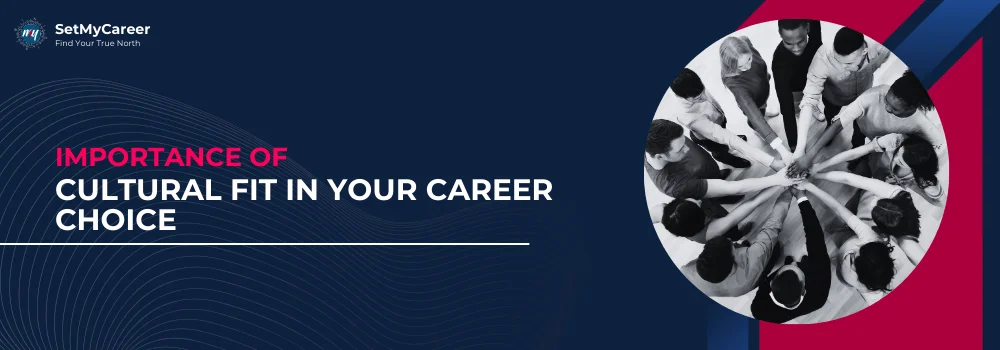Published by Jyothi Patil on 31 January 2024
Content Strategist | Editorial Team Member
Jyothi Patil is a skilled writer with a strong background in English literature, which she applies to crafting engaging content across various platforms. From writing blogs for her website and guest posts to creating pieces on Medium and Substack, Jyothi excels in making complex ideas easy to understand.
Learn the importance of cultural fit impact on your career choice, influencing job satisfaction, and long-term success in a work environment that suits you.

“Culture eats strategy for breakfast”
This iconic quote by management guru Peter Drucker perfectly captures why cultural fit matters so profoundly in building a smart, rewarding career choice.
Technical skills may help you land jobs, but it’s the unspoken norms, attitudes, and values that will make or break your happiness and success day to day.
When choosing a career, there can be many factors for you to consider — compensation, work-life balance, growth opportunities, and more.
But one element, the most crucial while at it, is cultural fit.
What do we mean by culture fit? It’s the match between your personal workstyle — how you operate best — and an organization’s systems, leadership approach, and unwritten rules. For example, do you thrive in competitive settings with high urgency? Or are you more fulfilled crafting work carefully in lower-pressure environments?
Neither is better; they just suit different personalities.
Maybe constant collaboration fuels you while others need regular solo workblocks for top performance. Beyond work norms, value alignment also matters hugely. Perhaps causes like sustainability or work-life boundaries shape job satisfaction for you more than a huge paycheck.
Read on to learn more about assessing culture fit proactively across industries and employers to set your career — and yourself — up for growth.

Find the perfect fit for your values and goals
Align Your CareerCultural fit refers to the degree to which your values, beliefs, and behaviors match those of a specific organization. Every workplace has a unique culture comprised of tangibles like policies, perks, and environment as well as intangibles like norms, attitudes, and workstyles.
When evaluating jobs and companies, it's important to assess whether you would thrive in – or clash with – these elements. Otherwise, you risk landing somewhere whose culture breeds discontent.
On the other hand, a strong cultural match sets you up for greater fulfillment, productivity, and advancement potential. Studies show that alignment with organizational culture leads to more engaged, loyal, and satisfied employees. Fitting in with the people and unwritten rules around you simply makes work more enjoyable and empowering. It also helps ensure your talents are utilized, freeing you to maximize your career potential.
When exploring industries and employers relevant to your interests and abilities, make cultural fit assessments at each stage. Some of the strategies are as follows:
Industry Culture:
Every industry from healthcare to tech to construction has subcultures with norms around communication style, workplace, hierarchies, and innovation. Tuning into these early helps guide you towards fields whose energetics best suit you.
Employer Culture:
Within the same domain, employers have unique cultures too. Feel free to research companies’ values, perks, leadership approaches, remote policies, office designs and more to find options likely to click with your preferences.
Interview Culture:
The interview stage presents a unique chance to experience an employer’s real culture. Notice how you’re treated, conversations that unfold, and subtle cues about workstyle. Does it feel aligned or give you pause? Trust those instincts!
These also help to connect with employees (your future colleagues). Many even offer internships where you can truly test-drive jobs firsthand.
What happens if you do wind up culturally misaligned with an employer? Some common friction points and results include:
Leadership style conflicts:
Struggling to perform under certain types of leadership or management philosophies misaligned with your own. Difficulty getting buy-in or autonomy.
Skill underutilization:
When norms around innovation, communication, collaboration, or workflow don’t allow you to leverage your strengths. Feeling constrained.
Value clashes:
Butting heads with company values around remote work, work-life balance, transparency, diversity policies, or something else important to you.
Lower Productivity:
Beyond just dissatisfaction, culture misfit can spur lower productivity, less willingness to go “above and beyond”, and even health issues like anxiety or depression.
If you end up in such a situation, first engage in open conversations with managers once you pinpoint areas of misalignment. There may be room for compromise or role changes. If tensions persist, however, it may, unfortunately, signal needing a culture shift via a new employer.
One overlooked factor that powerfully influences your career enjoyment and trajectory? Cultural fit: finding environments whose ways of working, leading, and allowing you to thrive as your authentic self while capitalizing on your strengths. By assessing culture fit throughout your journey as passionately as you do skill fit, you set the stage for greater fulfillment at work for years to come. Wondering how SetMyCareer can help you find your working style preferences? Reach out to us today and get started!
No. 14/595, 1st Floor, Nanjappa Reddy Layout, Koramangala 8th Block, Bangalore 560095